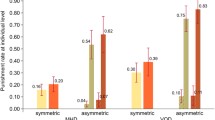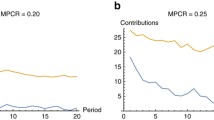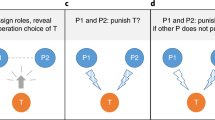Abstract
A key question about human societies is how social norms of cooperation are enforced. Subjects who violate norms are often targeted by their peers for punishment. In an experiment with small teams we examine whether subjects treat punishment itself as a second-order public good. Results do not support this view and rather suggest a hard-wired taste for punishment; subjects are engaged in a cooperative task but ignore the public good characteristics of punishment.
Similar content being viewed by others
References
Anderson, C. M., & Putterman, L. (2006). Do non-strategic sanctions obey the law of demand? The demand for punishment in the voluntary contribution mechanism. Games and Economic Behavior, 54(1), 1–24.
Andreoni, J. (1990). Impure altruism and donations to public goods: a theory of warm-glow giving. Economic Journal, 100, 464–477.
Andreoni, J., Harbaugh, W., & Vesterlund, L. (2003). The carrot or the stick: rewards, punishment and cooperation. The American Economic Review, 93(3), 893–902.
Bergstrom, T., Blume, L., & Varian, H. (1986). On the private provision of public goods. Journal of Public Economics, 29, 25–49.
Casari, M., & Luini, L. (2009). Group cooperation under alternative peer punishment technologies: an experiment. Journal of Economic Behavior & Organization, 71, 273–282.
Casari, M., & Plott, C. R. (2003). Decentralized management of common property resources: experiments with centuries-old institutions. Journal of Economic Behavior & Organization, 51(2), 217–247.
Charness, G., Rigotti, L., & Rustichini, A. (2007). Individual behavior and, group membership. The American Economic Review, 97(4), 1340–1354.
de Quervain, D. J.-F., Fischbacher, U., Treyer, V., Schellhammer, M., Schnyder, U., Buck, A., & Fehr, E. (2004). The neural basis of altruistic punishment. Science, 305, 1254–1258.
Falk, A., Fehr, E., & Fischbacher, U. (2005). Driving forces behind informal sanctions. Econometrica, 73(6), 2017–2030.
Fehr, E., & Gächter, S. (2000). Cooperation and punishment in public goods experiments. American Economic Review, 90(4), 980–994.
Fehr, E., & Gächter, S. (2002). Altruistic punishment in humans. Nature, 415, 137–140.
Fischbacher, U. (2007). Z-Tree: Zurich toolbox for readymade economic experiments. Instructions for experimenters. Experimental Economics, 10(2), 171–178.
Guererk, O., Irlenbusch, B., & Rockenbach, B. (2006). The competitive advantage of sanctioning institutions. Science, 312(5770), 108–111.
Mill, J. S. (1863). Utlitarianism. New York: Longmans.
Nikiforakis, N., & Normann, H.-T. (2008). A comparative statics analysis of punishment in public goods experiments. Experimental Economics, 11(4), 358–369.
Ostrom, E., Walker, J., & Gardner, R. (1992). Covenants with and without a sword: self-governance is possible. The American Political Science Review, 86, 404–417.
Sutter, M., Haigner, S., & Kocher, M. (2008) Choosing the carrot or the stick? Endogenous institutional choice in social dilemma situations (Working papers 2008-07). Faculty of Economics and Statistics, University of Innsbruck.
Varian, H. (1994). Sequential contributions to public goods. Journal of Public Economics, 53, 165–186.
Vyrastekova, J., Funaki, Y., & Takeuchi, A. (2008) Strategic vs non-strategic motivations of sanctioning (Working paper). Tilburg University, Center for Economic Research.
Xiao, E., & Houser, D. (2005). Emotion expression in human punishment behavior. Proceedings of the National Academy of Sciences of the United States of America, 102(20), 7398–7401.
Author information
Authors and Affiliations
Corresponding author
Electronic Supplementary Material
Below is the link to the electronic supplementary material.
Rights and permissions
About this article
Cite this article
Casari, M., Luini, L. Peer punishment in teams: expressive or instrumental choice?. Exp Econ 15, 241–259 (2012). https://doi.org/10.1007/s10683-011-9292-6
Received:
Accepted:
Published:
Issue Date:
DOI: https://doi.org/10.1007/s10683-011-9292-6




